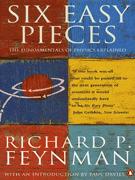 Ο Richard Feynman (1918-1988) είναι ένας από τους μεγαλύτερους θεωρητικούς φυσικούς του 20ου αιώνα. Καθηγητής στο Cornell, δούλεψε μαζί με το Hans Bethe στο Los Alamos. Το 1965 βραβεύθηκε με το βραβείο Nobel για τη δουλειά του στη θεωρία της κβαντομηχανικής.
Ο Richard Feynman (1918-1988) είναι ένας από τους μεγαλύτερους θεωρητικούς φυσικούς του 20ου αιώνα. Καθηγητής στο Cornell, δούλεψε μαζί με το Hans Bethe στο Los Alamos. Το 1965 βραβεύθηκε με το βραβείο Nobel για τη δουλειά του στη θεωρία της κβαντομηχανικής.
Το Six Easy Pieces είναι μια συλλογή διαλλέξεων στους φοιτητές του. Ο Feynman διακρινόταν για την ικανότητά του να εξηγεί πολύπλοκα θέματα φυσικής με απλό τρόπο, χρησιμοποιώντας παραδείγματα από την καθημερινότητα. Το βιβλίο είναι απολαυστικό και διαβάζεται πολύ εύκολα.
Το δυνατότερο σημείο του βιβλίο από το δεύτερο κεφάλαιο (Basic Physics):
What do we mean by “understanding” something? We can imagine that this complicated array of moving things which constitutes “the world” is something like a great chess game being played by the gods, and we are observers of the game. We do not know what the rules of the game are; all we are allowed to do is to watch the playing. Of course, if we watch long enough, we may eventually catch on to a few of the rules. The rules of the game are what we mean by fundamental physics. Even if we knew every rule, however, we might not be able to understand why a particular move is made in the game, merely because it is too complicated and our minds are limited. If you play chess you must know that it is easy to learn all the rules, and yet it is often very hard to select the best move or to understand why a player moves as he does. So it is in nature, only much more so; but we may be able at least to find all the rules. Actually, we do not have all the rules now. (Every once in a while something like castling is going on that we still do not understand.) Aside from not knowing all of the rules, what we really can explain in terms of those rules is very limited, because almost all situations are so enormously complicated that we cannot follow the plays of the game using the rules, much less tell what is going to happen next. We must, therefore, limit ourselves to the more basic question of the rules of the game. If we know the rules, we consider that we “understand” the world.
How can we tell whether the rules which we “guess” at are really right if we cannot analyze the game very well? There are, roughly speaking, three ways. First, there may be situations where nature has arranged, or we arrange nature, to be simple and to have so few parts that we can predict exactly what will happen, and thus we can check how our rules work. (In one corner of the board there may be only a few chess pieces at work, and that we figure out exactly.)
A second good way to check rules is in terms of less specific rules derived from them. For example, the rule on the move of a bishop on a chessboard is that it moves only on the diagonal. One can deduce, no matter how many moves may be made, that a certain bishop will always be on a red square. So, without being able to follow the details, we can always check our idea about the bishop’s motion by finding out whether it is always on a red square. Of course it will be, for a long time, until all of a sudden we find that it is on a black square (what happened of course, is that in the meantime it was captured, another pawn crossed for queening, and it turned into a bishop on a black square). That is the way it is in physics. For a long time we will have a rule that works excellently in an overall way, even when we cannot follow the details, and then some time we may discover a new rule. From the point of view of basic physics, the most interesting phenomena are of course in the new places, the places where the rules do not work -not the places where they do work! That is the way in which we discover new rules.
The third way to tell whether our ideas are right is relatively crude but probably the most powerful of them all. That is, by rough approximation. While we may not be able to tell why Alekhine moves this particular piece, perhaps we can roughly understand that he is gathering his pieces around the king to protect it, more or less, since that is the sensible thing to do in the circumstances. In the same way, we can often understand nature, more or less, without being able to see what every little piece is doing, in terms of our understanding of the game.
Εκδόσεις: Penguin
Μια απάντηση στο “Six Easy Pieces”